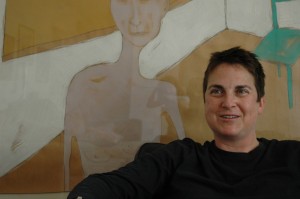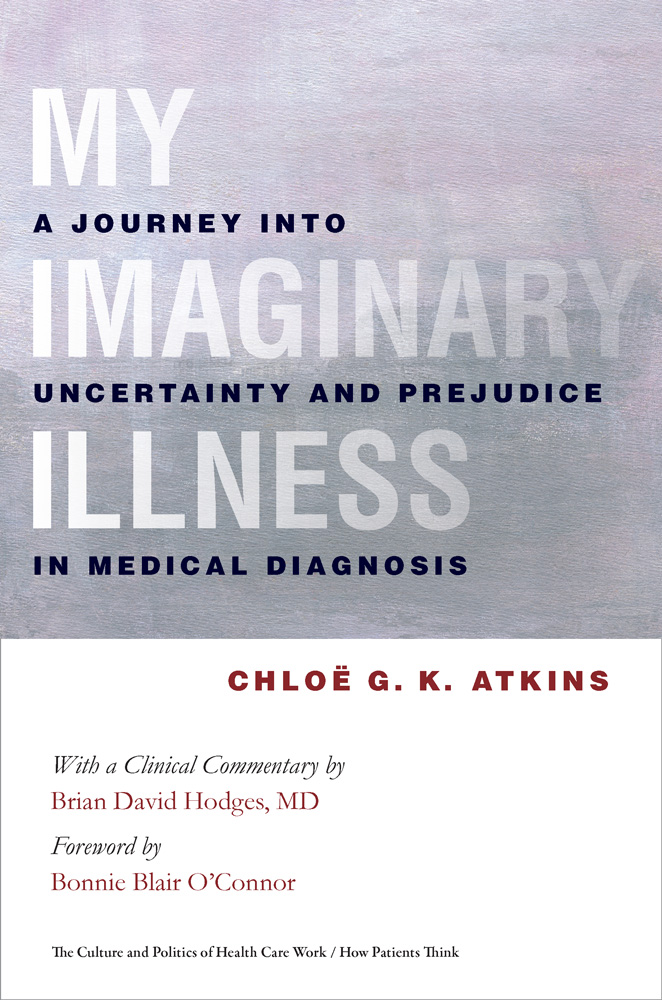 At age twenty-one, Chloë G. K. Atkins began suffering from a mysterious illness, the symptoms of which rapidly worsened. Paralyzed for months at a time, she frequently required intubation and life support. She eventually became quadriplegic, dependent both on a wheelchair and on health professionals who refused to believe there was anything physically wrong with her. When test after test returned inconclusive results, Atkins’s doctors pronounced her symptoms psychosomatic. Atkins was told not only that she was going to die but also that this was her own fault; they concluded she was so emotionally deranged that she was willing her own death.
At age twenty-one, Chloë G. K. Atkins began suffering from a mysterious illness, the symptoms of which rapidly worsened. Paralyzed for months at a time, she frequently required intubation and life support. She eventually became quadriplegic, dependent both on a wheelchair and on health professionals who refused to believe there was anything physically wrong with her. When test after test returned inconclusive results, Atkins’s doctors pronounced her symptoms psychosomatic. Atkins was told not only that she was going to die but also that this was her own fault; they concluded she was so emotionally deranged that she was willing her own death.
My Imaginary Illness is the compelling story of Atkins’s decades-long battle with a disease deemed imaginary, her frustration with a succession of doctors and diagnoses, her immersion in the world of psychotherapy, and her excruciating physical and emotional journey back to wellness. As both a political theorist and patient, Atkins provides a narrative critique of contemporary medicine and its problematic handling of uncertainty and of symptoms that are not easily diagnosed or known. She convincingly illustrates that medicine’s belief in evidence-based practice does not mean that individual doctors are capable of objectivity, nor that the presence of biomedical ethics invokes ethical practices in hospitals and clinics. A foreword by Bonnie Blair O’Connor, who teaches medical students how to listen to patients, and a clinical commentary by Dr. Brian David Hodges, a professor of psychiatry and a leader in medical education, enrich the book’s narrative with practical guidance for medical practitioners and patients alike.
You can also visit Chloe G. K. Atkins’ website.


Thank God I found you. I have been suffering with similar illnesses for the past 20 years). Reading your book was like reading my own story (although you had it to a far greater degree than I). The biggest issue was, of course, the doctors reactions and the emotional degradation that I suffered under their egos, lack of caring, disbelief in what my husband and I were telling them and and disinterest in caring enough about me as a person to realize that, even though their little machines and test could not give them proof positive that something was wrong, that I was in pain and lost any ability to be a full, contributing human being. I now feel like I have another soldier in my army. THANK YOU THANK YOU THANK YOU Roz Byus
“About My Imaginary Illness: | My Imaginary Illness” really got me personally addicted with your page!
I reallydefinitely will be back more regularly. Thanks -Richelle
I have spent all my money in trying to help my daughter get a diagnosis. Yet I’m afraid she won’t make it too much longer. Where can you direct me that is for non profit help as I think she is the same as Cloe
Your book gave me the inspiration to fight for a diagnosis for my multitude of symptoms post C5-C7 ACDF surgery on April 9, 2013. I am a practicing Veterinarian that had severe complications after this surgery. I was finally diagnosed with a severe Autonomic Storm immediately post-op that has disrupted my life completely for the last 18 months. I too have had very dismissive clinicians tell me it was just anxiety and sent me home with Xanax. Only to return to the emergency room with tachycardia, hypertension and gastroparesis. It has been a journey to research this syndrome and finally get my life back. Thank goodness I kept fighting and I have a wonderful Pharmacist husband who never doubted my symptoms. Your book was an inspiration!
Sheila E. Hartnett, D.V.M.
Thank you so much for writing a splendid book that every doctor should read. I am 75 years old, displaying symptoms of Myasthenia Gravis, only to be told, recently, that either I have degenerative denentia or my symtoms are manifested and that my illness is pyschomatic. I went home and wept. I felt humiliated and degraded as a human being. My speech is badly slurred, swallowing difficulties, breathing problems where I need night oxygen and I suffer from camptocormia, which I have read precedes Myasthenia. I spend most of the day resting. Upon research I see elderly people often do not display limb weakness and may test positive for the other antibodies rather than the common one, AChR. First signs in the elderly is badly impaired speech. I have nearly given up. I have grown so frail and weary, I have wrote countless letters to different medics. I have hypothyroidism and am hoping to try natural thyroid replacement in the hope that a change in medication might put the myasthenia into remission, I can but try. It must have taken a lot of courage to write of your cruel experiences at the hands of the very people we turn to for help. You suffered so much. The worst part is being labelled a pyschomatic when you know in your heart that your illness is for real.xxx